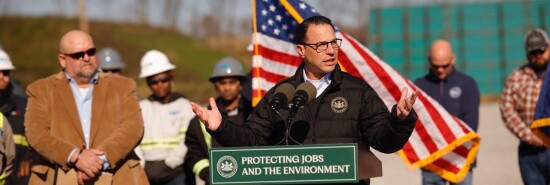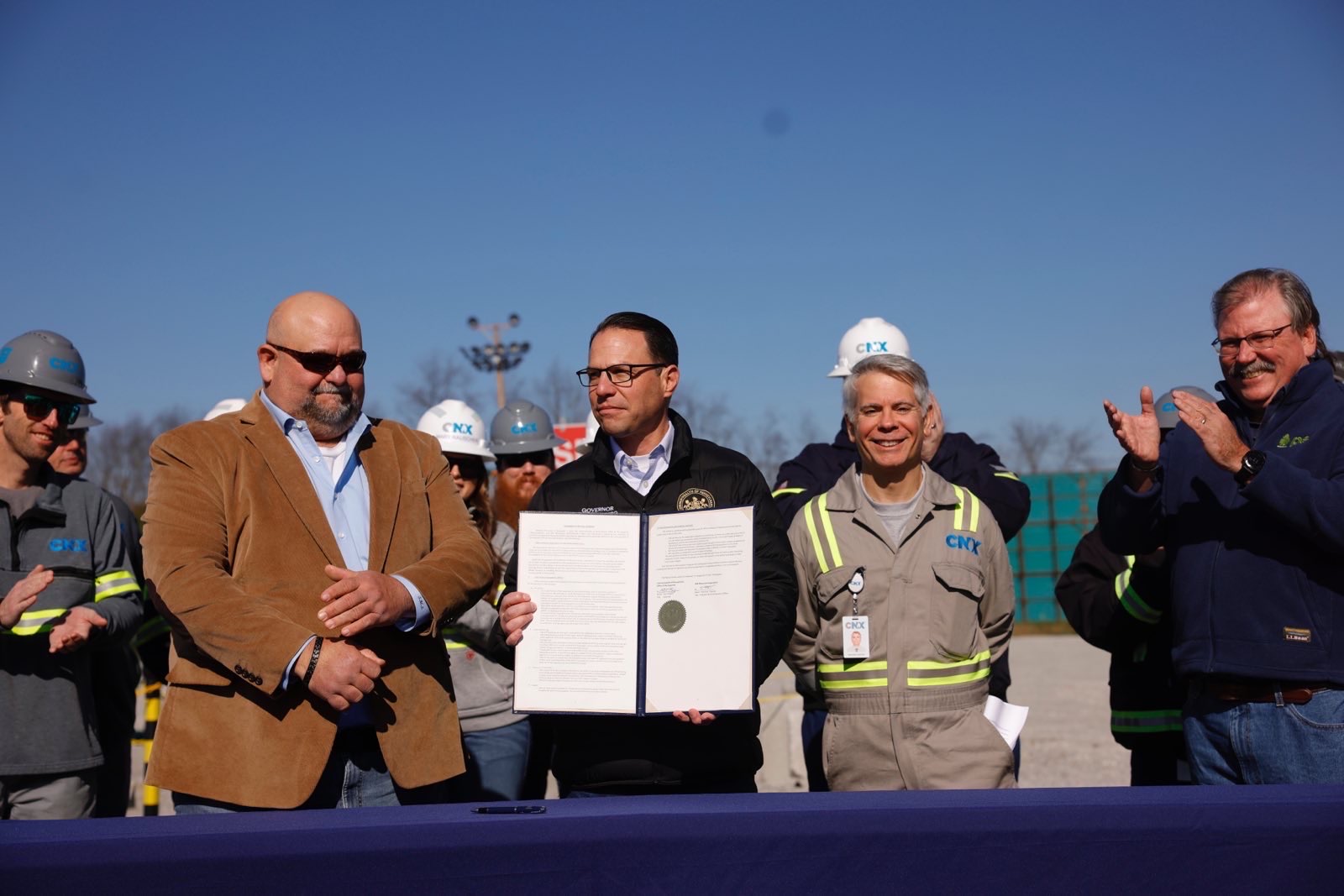
Pennsylvania Gov. Josh Shapiro partners with natural gas giant
Salena Zito
Video Embed
CLAYSVILLE, Pennsylvania — It is not very often in American politics that a sitting Democratic governor, a union leader, an environmentalist, and the conservative CEO of one of the top natural gas-producing companies in the state are all standing shoulder to shoulder in support of the same program.
Yet that is exactly what happened Thursday morning in this tiny Washington County borough. Gov. Josh Shapiro (D-PA) and CNX CEO Nick Deluliis, flanked by the business agent for the Boilermakers local union, Shawn Steffee, and the president of the Pennsylvania Environmental Council, Davitt Woodwell, people often at odds with each other, announced a collaboration between the natural gas giant and state environmental regulators to ensure transparently the natural gas industry is performing its work in line with the highest regulatory standards.
BIDEN HECKLED BY RABBI CALLING FOR GAZA CEASEFIRE DURING CAMPAIGN STOP
Shapiro said in a news conference at the CNX well pad after the announcement that he was driven by his commitment to do everything in his role as governor to keep Pennsylvania families safe.
“I believe to do that, we need to bring transparency to this process, collect more data so we can ensure that we have the necessary and appropriate protections in place,” he said.
The first-of-its-kind collaboration between a major natural gas producer and a state government will have both working together to collect data on air emissions and water quality at well sites, resulting in a transparent disclosure of drilling chemicals and expansion of the buffer zones.
Shapiro said the intensive environmental monitoring at well sites will occur throughout all stages of the drilling and fracking process: “That data can be used to drive policy and regulation changes.”

Deluliis explained CNX will report air quality data on a new website beginning with the existing well here in Washington County and will expand over the next few weeks across the entire state. He said the agreement is completely voluntary and that the nexus of his collaboration with Shapiro began several months ago after a shared passion for data and transparency.
“I love data,” Deluliis said. “I want to know. It’s the engineer in me. What I don’t like is policy or regulation that is set based on the unknown, on the speculative, because, well, you just don’t know,” he said of non-data-driven speculative assessments of what might be happening in the industry.
Deluliis, whose company has drilled more than 500 wells in the massive Pennsylvania Marcellus Shale natural gas field, added he is also a huge fan of rational thought, rational policy, and rational regulation when data is informing it.
“A lot of the technology, a lot of the asset base, a lot of the processes that we’ve built up over the last number of years, you add them all up, it could lead to something like radical transparency quite easily,” he said.
Deluliis said his approach to improving the reliability and accuracy levels in the industry was to use the same diligence used for the company’s finances.
“We know how to accurately report financial information because we’re a public company with the SEC, and there’s all that rigor and auditing that goes into it,” he said. “Let’s copy that and paste it into the regulatory reporting arena so that we treat the regulatory emissions data, etc., with the same rigor and structure that we do with financial data.”
Shapiro said in an interview with the Washington Examiner his expectation is the monitoring program will measure emissions at well sites across the state and expand the setbacks from the state-required 500 feet at all drilling sites to 2,500 feet for schools, community centers, and hospitals.
A grand jury concluded in 2020 after a two-year investigation that state regulators had failed to prevent Pennsylvania’s natural gas drilling industry from sickening people and poisoning air and water.
Shapiro, who was the state attorney general in 2020, said the one thing that was clear from the grand jury report that came out were the concerns Pennsylvanians had about their public safety and public health.
“Obviously, as attorney general, one of the ways you can accomplish that is by holding those accountable who break the law,” he said. “But going forward, what you really need is a process that has greater data collection and transparency and answers for the public.”
Shapiro said the agreement Thursday gives the public all of that: “There is real-time data collection, first in the nation in terms of the type of data that’s being collected, that will then inform decisions and steps we take in the future and give the public the peace of mind as to what’s happening in their community.”
Shapiro said he really wanted to try building on the work that the grand jurors started but really wasn’t sure where to start.
“It was clear that lawmakers and Nick was also expressing a desire to see more transparency and focus on public safety,” the governor said. “And we started just by having a conversation, and one conversation led to another, which led to another. And we realized notwithstanding some really significant political differences that just through talking, we could find some common ground on some really important issues that the grand jurors laid out, that he wanted to address and that I wanted to address.”
Deluliis said his approach to this collaboration came from all of the hats he wears in his daily life as a CEO, a father, a resident, and as a leader in an industry, which he says gives him a wide variety of viewpoints to come to this moment.
“There is certainly a very strong rationale for CNX to drive toward this, as well as an industry advocate and a citizen. However, for me, it’s the combination of all that, and it gives us an opportunity as an entity to be able to do something,” he said. “It’s rare that you can see something that actually will benefit those very different groups of stakeholders in an area you call home and you’ve called home your entire life.”
Shapiro said the announcement shows CNX is committed to keeping the communities where their wells are safe because they, like Deluliis, live, work, and play in those areas.
“There are over 450 people who work for CNX. They live in Washington County and around Washington County. They go hunting, hiking, and fishing here. They raise their families here. They want their kids to live in an environment that is healthy and safe,” he said.
CLICK HERE TO READ MORE FROM THE WASHINGTON EXAMINER
“I hope this announcement today shows that, at least CNX, I’m hopeful other companies will follow suit, and their employees who live in these regions where this energy production’s occurring, care about the community just as much as others in the community do,” Shapiro said.
Pennsylvania is the nation’s No. 2 gas-producing state after Texas, supporting more than 100,000 jobs statewide and contributing over $40 billion in state economic activity.
